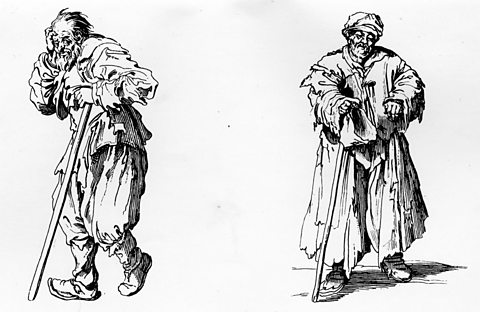The growth of economic pressures in the Tudor period
There was an increase in poverty in the 16th century. This was caused by the population growing faster than jobs were becoming available, as well as changing trade patterns and farming practices. As a result of this increasing poverty, there was also an increase in crime.
Economic changes

During the 16th century, there was a sharp increase in the number of vagrant±«Óătvless, unemployed person who wandered the streets. Vagrancy came to be seen as a serious crime in Tudor times. In this period, many people believed vagrancy was caused by idleness. People saw the vagrants, or vagabonds, as weak, lazy people.
Some people blamed vagrants for encouraging drunkenness. Others believed vagrants had been born with a flaw that led them into idleness and crime.
Many people felt threatened by the vagrantsâ presence, believing they were spreading the plague. It was also commonly thought that they were likely to rise up in rebellion, as some were ex-soldiers. In response, the Elizabethan Poor Laws of 1598 and 1601 made each parish responsible for looking after its poor and punished vagabonds.
However, there were several economic pressures in this century that explain the rise of poverty and the crime of vagrancy.
The population of England and Wales was increasing during the 16th century, from around 2.9 million in 1500 to around 4.3 million in 1600. This led to more people competing for jobs and land.
Trade and commerce increased. Some merchants and landowners were getting richer. However, most people were still very poor.
Unemployment
Many people worked in the cloth industry. However, the cloth trade went into a slump several times in the 15th and 16th centuries, after European ports were cut off from English trade during the Hundred Years' War From 1337 to 1453, wars between the rulers of England and France over who controlled France. There were also shifting trading patterns, which saw the decline of the Belgian port of Antwerp (the major trade hub for the sale of English cloth). As a result, many weavers and spinners lost their jobs and incomes.
Unemployment was not just a problem in the cloth industry. Henry VII disbanded the private armies that had existed during the Wars of the Roses Wars during the 15th century between the houses of York and Lancaster. The wars were a fight for the throne of England. The wars ended when Henry VII became king in 1485. This led to many men losing their jobs. Many nobles also lost their wealth during these wars, so they began to employ fewer people on their land and estates.
Tenant farmers
In Tudor times, many people were tenant farmers. This means that they rented or leased land from wealthy nobles or merchants. Richer farmers and merchants began to enclose land for sheep farming - in a process known as enclosureThe process of reducing the huge number of small landholdings to create larger, more efficient farms. The cost of renting land rose rapidly - this was known as rack-renting. This deprived many tenants of their rented land. This meant more people fell into poverty.
Tenant farmers relied on the harvest for their survival. There were many bad harvests in the 16th century, especially in 1556, 1596 and 1597. These factors led to rural de-population as workers were forced to leave the countryside and look for jobs in towns.
Inflation
Poverty was made worse by inflationA general increase in prices, resulting in a fall in the purchasing value of money. The prices of essential goods, including food, rose as the population grew, forcing some people to leave their homes in search of help and food.
Increases in taxation to pay for wars against France, Scotland and Spain also made people poorer and inflation worse.
Dissolution of the monasteries
The dissolution of the monasteriesBetween 1536 and 1541, Henry VIII closed all of the monasteries in England and Wales. All of their land and buildings were sold. under Henry VIII increased the number of unemployed people, eg monks, servants and labourers. At the same time, it removed the help for the poor and sick that monasteries had provided.